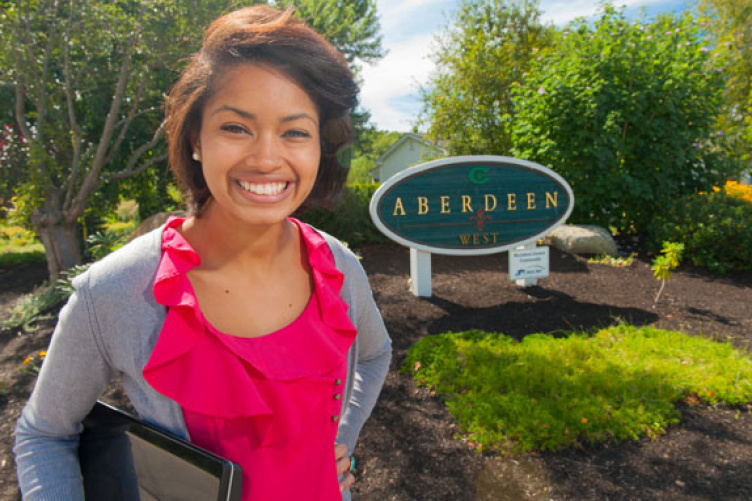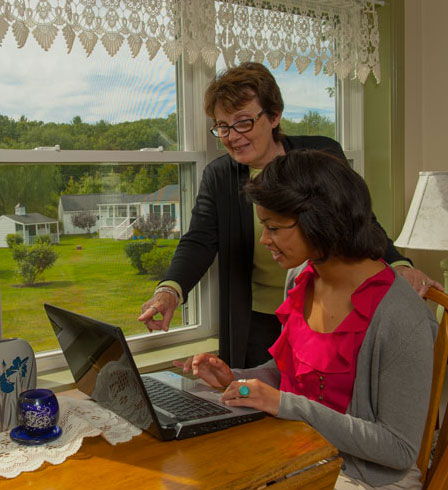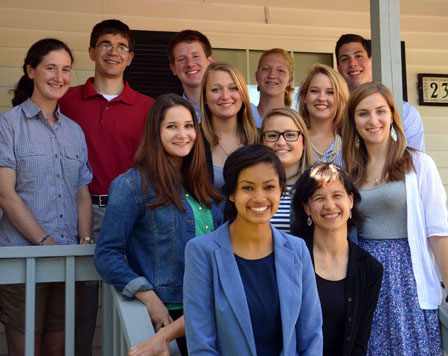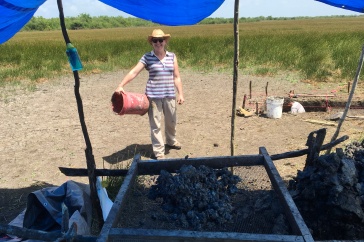
Nyomi Guzman at Aberdeen West, a manufactured home community in Stratham, NH.
When Nyomi Guzman ’14 listens to Nancy Pearce, a retired high school teacher, describe all the different birds she’s seen in her back yard in Stratham, N.H., she can’t help but smile. Pearce loves her manufactured home or “mobile home” and proudly shows Guzman the additions, the deck, and that beautiful backyard.
“After we downsized and bought this home in Aberdeen West, Joe and I were able to really retire,” says Pearce. “We’ve been able to do a lot of traveling. But I tell you, we all feel a lot more secure financially since we bought the land four years ago. I’m the secretary for the board so I know everyone, but now that we own the property we’ve really become a community.”
Recently when Pearce’s husband fell ill, she came back from the hospital and found a note on her door—“dinner’s ready, just come over and pick it up.”
This past summer, Guzman heard stories like Pearce’s from homeowners all across the country as she worked to build websites for resident-owned communities that were established with the help of ROC USA, LLC. (See related story.)

Pearce view a community website.
“ROC USA helps people who live in manufactured home communities,” says Guzman. “They help homeowners in for sale communities purchase the land underneath their homes collectively. And then they empower communities to sustain themselves. Each community works with a certified technical assistance provider.” The websites Guzman works on build community and help to sell vacant homes quickly, which keep everyone’s monthly payment toward their overall mortgage low.
ROC USA in Concord, N.H., builds on the success of the non-profit New Hampshire Community Loan Fund, which has worked closely with homeowners in manufactured home communities since 1984. In New Hampshire about 20 percent of all the manufactured home communities are resident owned. In 2008, ROC USA was formed to take the program to a national level.
Guzman became involved with ROC USA through the Carsey Social Innovation Internship program. “I found out about the internship at the Net Impact UNH Career Fair last year,” says Guzman. Her application was successful and she became one of 11 Carsey interns to work at organizations—both for-profit and non-profit—that have an innovative, market-based approach to achieving their social or environmental mission.
Ethics and social justice have always been important to Guzman, even as a high school student in Amherst, N.H. With a double major in communication and women’s studies and two minors in queer studies and race, culture, and power, Guzman has powered through a huge amount of academic work. She’s done so with real accomplishment, publishing a lengthy academic article in Commentary, the journal for communication majors, titled “Interracial Couples in Romance Films: Fact or Fantasy.” Her extracurricular work has also been noteworthy. She is a Connect Program mentor, supporting first-generation, low income, and multicultural students at UNH. In the summer of 2012, she was a McNair Scholar. Last year she was chair of the Diversity Support Coalition (DSC), which comprises six organizations with a total of 180 members and is governed by a 36-member executive board. “Both the McNair and DSC experiences taught me how to listen, especially to people who are different from me,” says Guzman.
And then this summer she had the internship.

Turrell (right front, wearing black), executive director,
Center on Social Innovation and Finance at the Carsey
Institute. “The interns learn first-hand about the power
of business to tackle longstanding community challenges.
Then they bring their experiences back to campus as
leaders in the Net Impact UNH student organization,
which promotes careers with impact,” says Turell who
runs the internship program and co-advises Net Impact
UNH. Photo courtesy Mike Bullard.
“My first day was mostly training and getting oriented. They explained the programs I’d be using to make websites for the communities. My task was to tackle a list of 50 potential websites,” says Guzman, “and I had never made a website in my life.
“So,” she continues with real understatement, “I spent the next two weeks getting acquainted with the program. I looked at the resources and found a good model to replicate. Then I created a template for each website. Once I figured out how to make the websites more personal and accurate, I began to contact the communities. That was awesome.”
Guzman says one of the best things about ROC USA is that “everyone there is pumped to do what they’re doing. Just having people be so friendly and kind really matters,” says Guzman. “Even the CEO of ROC USA, Paul Bradley is there and he’s accessible and easy to talk to.”
By mid-July, her first two websites went live. Her ROC USA supervisor Mike Bullard said to her, “This is awesome! You’ve got to tell everyone!”
By mid-August, her website for Cranberry Village Residents Association
in Carver, Mass., had garnered more than a 1,000 hits. But Guzman was already onto websites for communities in Washington State, Minnesota, Delaware, and Montana. This meant scheduling phone conversations with busy people in myriad time zones. By the end of the summer with 7 sites completed and about 23 in the works, Guzman, like most of her fellow interns, opted to continue working for her organization through the summer. Meanwhile, ROC USA hired a part-time person to continue her valuable efforts.
While Guzman plans to go to graduate school, her experience this past summer is about lifelong learning. As Guzman notes, “There’s often a lot of stigma around manufactured homes. For these homeowners to come together, to buy their land, and then to become a community—it takes a lot of heart and commitment.”
2013 Carsey Social Innovation Internships
Learn about Carsey Social Innovation Internship sites and the 2013 interns. >>
Net Impact UNH student blog
Carsey Social Innovation Interns write about their internship experiences. >>
-
Written By:
Staff writer | Communications and Public Affairs



















































